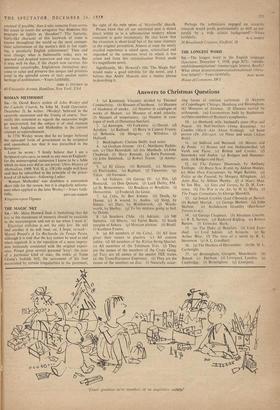Answers to Chri stmas Questions
1. (a) Kinematic Viscosity divided by Thermal Conductivity. (b) Measure of hardness. (c) Measure of blackness of smoke. (d) Number in catalogue of works of Mozart. (e) Measure of wind velocity.
(f) Measure of temperature. (g) Number in cata- logue of work of Domenico Scarlatti.
2. (a) Auvergne. (h) Yorkshire. (c) Dorset. (d) Ayrshire. (e) Rutland. (f) Berry in Central France.
(g) Bohemia. (It) Hungary. (i) Wiltshire. (j) Holland.
3. Buckingham; Chelsea Delft; lead resist.
4. (a) Graham Greene. (b) C. Northcote Parkin- son. (c) Thor Heyerdahl. (d) Iris Murdoch. (e) John Chadwick. (f) Mary Renault. (g) Boris Pasternak.
(h) John Steinbeck. (i) Robert Traver. (D Anony- mous.
5. (a) El Greco. (b) Botticelli. (c) Moretto.
(d) Pintiricchio. (e) Raphael. (f) Tintoretto. (g) Titian. (h) Veronese.
6. (a) Voltaire. (b) George IV. (c) Pitt. (d) Bismarck. (e) Don Quixote. (f) Lord Derby, PM. (g) St. Bonaventura. (10 Boudicca or Boadicea. (i) Democritus. (j) Frederick the Great.
7. (a) Celia, by Ben Jonson. (h) Death, by Donne. (c) A wound, by Auden. (d) Sleep, by Sidney. (e) Duty, by Wordsworth. (f) Words- worth, by Shelley. (g) To his mistress going to bed, by Donne.
8. (a) Southern Chile. (b) Adriatic. (c) NE Sumatra. (d) Siberia. (e) Tarim Basin. (f) South margins of Sahara. (g) Mexican plateau. (h) Brazil.
(i) Southern France.
9. (a) All members of the Cabal. (b) All have given their names to glaciers. (c) All contain iodine. (d) All members of the 'Cohan String Quartet.
(e) All members of the Telemann Trio. (f) They are the names of the members of the Crazy Gang. (g) They are all names of the special TEE trains, i.e. the Trans-European Expresses. (h) They are the names of the numbers on dice. (i) Naturally occur- ring forms of calcium carbonate. (/) Airports of Copenhagen, Chicago, Hamburg and Birmingham. (k) Measures of distance. (/) Diseases carried by arthropods. (m) Locomotives built by Stephenson. (n) Opus numbers of Brahms's symphonies.
10. (a) Husband, wife, husband's sister (War and Peace). (b) Half-brothers (Anna Karenina). (c) Cousins (Much Ado About Nothing). (d) Same person (Dr. Zhivago). (e) Niece and uncle (Adam Bede).
I1. (a) Sullivan and Burnand. (h) Mozart and da Ponte. (c) Strauss and von Hofmannsthal. (d) Verdi and Piave. (e) Britten and Crozier. (f) Stravinsky and Auden. (g) Rodgers and Hammer- stein. (10 Rodgers and Hart.
12. (a) The Eustace Diamonds, by Anthony Trollope. (h) Brave New World, by Aldous Huxley. (c) Mine Own Executioner, by Nigel Balchin. (d) Police at the Funeral, by Margery Allingham. (e) Antic Hay, by Aldous Huxley. (f) A Man's Man, by Ian Hay. (g) Sons and Lovers, by D. H. Law- rence. (It) The War in the Air, by H. G. Wells. (i) The Tragic Comedians, by George Meredith.
13. (a) Josiah Crawley (Last Chronicle of Barset).
(b) Robert Herrick. (c) George Herbert. (d) John Skelton. (e) Archdeacon Grantley (Barchester Towers et al.).
14. (a) George Chapman. (b) Abraham Lincoln.
(c) R. S. Surtees. (d) Rudyard Kipling. (e) Robert Burton. (f) Groucho Marx.
15. (a) The Duke of Beaufort. (b) Lord Ever, shad. (c) Lord Adrian. (d) Aristotle. (e) Sir Arthur Bliss. (f) The hero of a novel by R. L. Stevenson (g) A. L. Goodhart.
16. (a) The Duchess of Devonshire. (b) Dr. M. L. Cartwright.
17. (a) Birmingham, Glasgow, Manchester. (b) Bristol. (c) Durham. (d) Liverpool, London. (e) Cambridge. (f) Birmingham. (g) Liverpool.
'Thank• goodness we're members of an acquisitive society.'


























 Previous page
Previous page